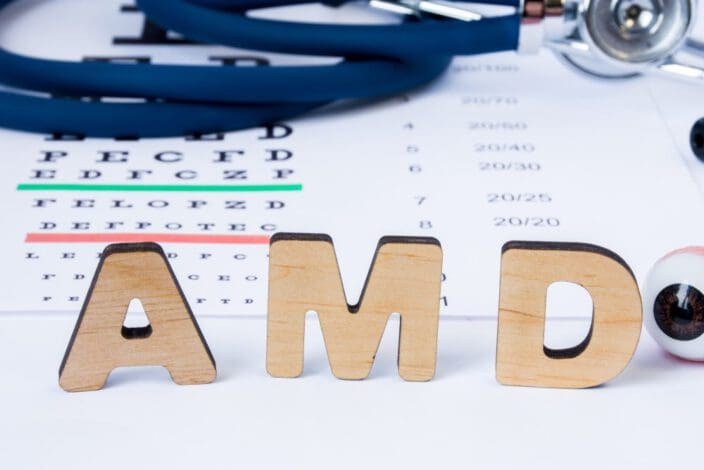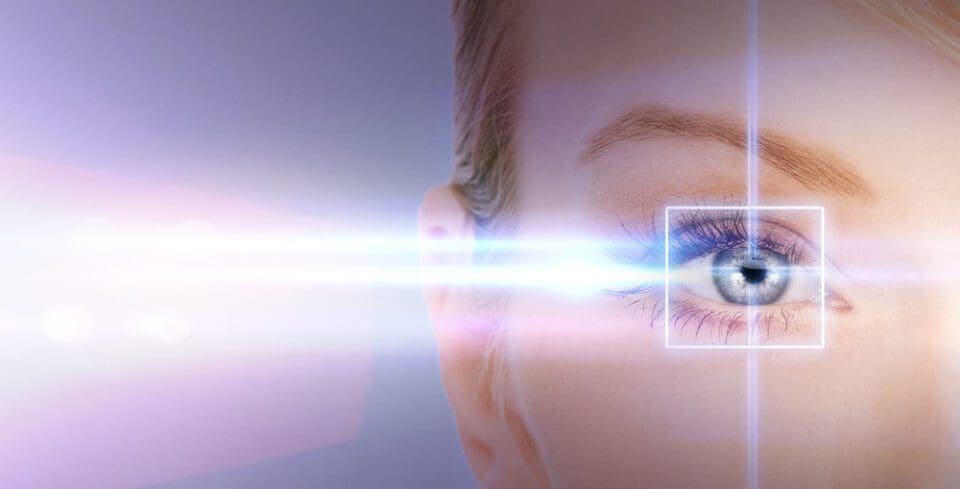Can You Naturally Reverse Macular Degeneration (AMD)?
Last Updated:
Age-related macular degeneration (AMD) leads to loss of vision, especially in the central part of the vision. There are three basic stages of AMD, and the first two may not be noticeable except to your optometrist.
Table of Contents
If you are diagnosed with AMD, you can make lifestyle changes, like eating a healthy diet, quitting smoking, and exercising more, to lower blood pressure or cholesterol, which can slow down the condition. Taking a specific vitamin supplement has also been found to help.
Lifestyle changes make a greater impact on dry macular degeneration. Wet macular degeneration is more likely to need medical treatment. It is important to know, regardless of what type of macular degeneration you are diagnosed with, the disease cannot be reversed; however, progression can be slowed thanks to improving therapeutic approaches.

What Is Age-Related Macular Degeneration (AMD), and Can It Be Reversed?
Macular degeneration is also predominantly age-related macular degeneration (AMD). It is a condition in which the macula, a cluster of photoreceptive cells in the center of the retina, begins to break down.
AMD is the leading cause of vision loss for American adults older than 60. While it predominantly affects people over age 65, it can begin around age 50. There are very rare conditions in which macular degeneration begins in childhood or adolescence, but typically, when a person is diagnosed with macular degeneration, it is age-related.
You deserve clear vision. We can help.
With 135+ locations and over 2.5 million procedures performed, our board-certified eye surgeons deliver results you can trust.
Your journey to better vision starts here.
While AMD does not hurt, it does lead to loss of centralized vision when untreated. The middle of your vision will become blurry, fuzzy, dark, or “missing.” Your peripheral vision will remain intact.
AMD is caused by the accumulation of drusen, which is detritus from the epithelium that in normal, younger, or healthier eyes is eliminated by fluid. When this process does not function well, drusen collects around the retina, begins to prevent new cells from forming, and damages the older ones. This stage may be the only stage that occurs, and it is called dry macular degeneration.
In response to cell death in the area around the macula, blood vessels may grow to provide more oxygen and nutrients, and attempt to dispose of more waste. Rather than improving vision, however, the presence of new blood vessels leads to further loss of vision. This stage can occur before or after dry macular degeneration, and it is often considered a separate condition called wet macular degeneration.
There are three stages of macular degeneration: early, intermediate, and late. You are not likely to experience many symptoms in the first two stages; however, with regular eye exams, you may receive a diagnosis of macular degeneration. Your optometrist or ophthalmologist will then work with you to manage the condition and slow its progress. There is no method to stop or reverse macular degeneration, but there are several options to slow it down, many of which are natural, healthy lifestyle choices.
How to Reverse Macular Degeneration Naturally
Put simply, you cannot reverse macular degeneration naturally. However, it’s essential to understand that AMD cannot be reversed, either through natural methods or medical treatments.
What can be done, though, is to slow down the progression of AMD through various natural approaches. Although the term “reverse” might not be applicable, these methods can have a significant positive impact on managing the condition:
Healthy Lifestyle Choices
Eating a diet rich in vegetables, especially leafy greens, reducing sugar intake, consuming more omega-3 fatty acids, and exercising regularly are some ways to support eye health.
Avoiding Smoking
Quitting smoking can prevent the acceleration of AMD and slow down its progression.
Specific Supplements
Supplements such as the AREDS2 formula can significantly slow the progress of advanced AMD. It’s essential to consult with healthcare professionals to understand the right supplementation for your specific condition.
Regular Eye Check-ups
Regular examinations by an optometrist or ophthalmologist can catch the early stages of AMD, allowing for prompt intervention to slow down the disease.
While it’s clear that reversing AMD is not possible, the focus on natural management strategies can support overall eye health and slow the condition’s progression. Engaging with healthcare professionals to tailor these approaches to individual needs can make them even more effective.
What Are Some Natural or Home Remedies to Treat AMD?

Taking vitamin and mineral supplements is the primary lifestyle change used to treat AMD. There may be some supplement brands claiming to reverse AMD, but it is important to know that this condition cannot be reversed; however, it can be slowed.
A study conducted by the National Eye Institute (NEI) found that, for people with advanced macular degeneration, taking a dietary supplement known as AREDS2 significantly slowed the progress of the disease. However, for people in the early stages of AMD, there was no slowing of the disease, and the supplement did not prevent the disease from occurring.
The AREDS2 supplement included 500 mg of vitamin C; 400 IU of vitamin E; 80 mg of zinc (as zinc oxide); 2 mg of copper (as cupric oxide); 10 mg lutein; and 2 mg zeaxanthin.
Other dietary steps to take include:
- Avoid beta carotene.
- Eat more vegetables, especially leafy greens.
- Reduce sugar intake significantly.
- Consume more omega-3 fatty acid foods, like fish.
- Eat more fruit, especially high-fiber fruit.
Regular exercise is also important. People with high blood pressure, high cholesterol, and/or obesity are more likely to develop macular degeneration. Maintaining a healthy weight, blood pressure, and cholesterol level can reduce the risk of macular degeneration and slow down the condition’s progress if it appears.
Smoking cigarettes accelerates vision loss and puts you at risk for developing several eye conditions, including macular degeneration. If you are diagnosed with macular degeneration, smoking will make the disease progress faster. If you do not have macular degeneration, smoking increases your risk of contracting AMD. Quitting can slow the condition’s progress or reduce your risk of AMD.
You deserve clear vision. We can help.
With 135+ locations and over 2.5 million procedures performed, our board-certified eye surgeons deliver results you can trust.
Your journey to better vision starts here.
What Are Other Methods to Treat AMD?

Aside from lifestyle changes, there are no standard treatments for dry macular degeneration. Working with your optometrist or ophthalmologist to monitor the condition’s progress and determine if there are any changes is the only other approach to treatment.
Wet macular degeneration moves faster than dry macular degeneration, and it is more likely to lead to blindness. Fortunately, there are some surgical options to treat this problem. You will be referred to an ophthalmologist who specializes in retinas for treatment. You will then receive treatments called anti-vascular endothelial growth factor (anti-VEGF), which help to shrink or eliminate abnormal blood vessels growing in and around the macula.
Anti-VEGF treatments are injections that go directly into the eye, once per month. You may receive treatment with these shots for months or years. This procedure has a high success rate in stopping new blood vessels from forming and dramatically slowing the progress of wet macular degeneration; however, these procedures do not reverse macular degeneration, so you will not regain sight you have lost.
According to a study of 650 participants with AMD, after five years of anti-VEGF treatment, half of the participants retained 20/40 vision or better, which is enough to legally drive and be able to read or participate in other activities. About 20 percent of participants had 20/200 vision or worse, which is legal blindness. The remaining group was somewhere in between with their vision loss.
Another treatment for wet AMD is laser photocoagulation. Until very recently, this approach to sealing leaking blood vessels around the macula was the only treatment for wet AMD. A drug is injected into the arm and exposure to lasers will activate it, sealing off leaking vessels and slowing the progress of wet macular degeneration.
While some people were successfully treated with this approach, that represented only about 10 to 15 percent of study participants. Of those who were successfully treated, about half experienced blood vessel leakage around their retinas in the next two years.

There are additional treatments being explored, especially for dry AMD. It is best to get regular eye exams, and let your optometrist know if you have experienced new or worsening vision problems.
Slowing AMD Is Possible With Help From Experienced Ophthalmologists
Macular degeneration is considered incurable, but with treatment, you can greatly reduce your chances of significant vision loss. Working closely with your ophthalmologist to care for your eyes means that you can slow down macular degeneration, and you may be one of the many people who retain vision well enough to continue driving, reading, working on a computer, and performing other daily activities.
If you have dry macular degeneration, ask about healthy lifestyle changes you can make. If you have wet macular degeneration, ask about lifestyle changes, anti-VEGF treatments, and what you can expect.
You deserve clear vision. We can help.
With 135+ locations and over 2.5 million procedures performed, our board-certified eye surgeons deliver results you can trust.
Your journey to better vision starts here.
References
- Facts About Age-Related Macular Degeneration. (November 2018). National Eye Institute (NEI).
- Age-Related Macular Degeneration. (2018). American Optometric Association (AOA).
- Macular Degeneration. (April 12, 2016). Medline Plus.
- Macular Degeneration. eMedicineHealth.
- NIH-Funded Study of Avastin and Lucentis Examines Their Effects at Five Years. (May 2, 2016). National Eye Institute (NEI).
- Macular Degeneration Treatments. American Macular Degeneration Foundation (AMDF).
This content is for informational purposes only. It may have been reviewed by a licensed physician, but is not intended to serve as a substitute for professional medical advice. Always consult your healthcare provider with any health concerns. For more, read our Privacy Policy and Editorial Policy.
